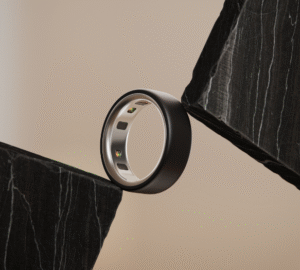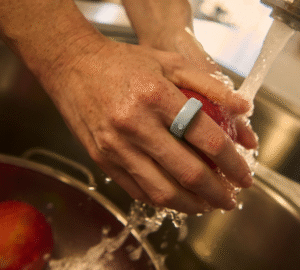As people around the world tuned into the presidential debate last night between President Joe Biden and former President Donald Trump, the tumultuous exchange led to a palpable sense of stress in many viewers’ bodies and minds.
At Oura, we have the unique ability to tap into biometric data trends from our members, providing a fascinating insight into how major events can affect our physiological stress levels.
To learn more about how the first presidential debate impacted Oura members, Oura’s data science team looked at anonymized and aggregate data from a randomly sampled group of 100,000 Oura Ring members in the U.S. as the debate began. 15% of the members sampled experienced notable effects.*
Here are three key findings.
Evening Heart Rate Levels Stayed High
Typically, we expect to see heart rate levels drop sharply in the evening as individuals wind down and prepare for sleep. However, about one hour into the debate, the average heart rate in beats per minute (bpm) was 87.6 bpm, compared to 82.8 bpm one week prior at the same time of day. This represents a 5.9% increase, or an additional 4.9 bpm, underscoring how the debate kept viewers’ bodies in a more alert and active state longer than usual.
Heart Rate Variability Dropped
Heart rate variability (HRV), a key indicator of stress and overall heart health, also reflected the heightened tension. By the end of the debate, we saw that the average HRV dropped to 33.4 ms, down from 34.9 ms a week prior—a 4.3% decrease. Lower HRV is typically associated with higher stress levels and a less resilient heart, highlighting how the debate took a physiological toll on viewers.
Gender Distribution Reflects Oura’s Changing Demographics
Our analysis also revealed the gender distribution of the sampled members: 60.0% female, 39.6% male, and 0.5% other. This gender breakdown mirrors the current demographics of Oura members, where women are in the majority — reflecting how our commitment to women’s health features has resonated strongly among females.
High Stakes, High Stress
For many, debates and other political events are more than just opportunities to gain information; they can be deeply emotional experiences. The stakes feel high, and the rhetoric often aims to provoke strong reactions.
For Oura members, this data serves as a reminder to be mindful of their body’s reactions to external stressors. Here are a few tips to help manage stress during such events:
- Take a deep breath: Deep breathing exercises can help activate the parasympathetic nervous system, promoting relaxation and lowering heart rate. Oura members can access breathing exercises in the Oura App’s Explore content.
- Stay hydrated: Drinking water can help maintain physical and cognitive function, especially when under stress. Avoid alcohol, which can also trigger higher heart rates and stress levels.
- Watch mindfully: Be aware of your emotional state while watching. Remember, it’s okay to turn off the TV or step away if it becomes overwhelming.
RELATED: 12 Science-Backed Ways to Lower Your Stress, According to Oura Members
*At ŌURA, protecting your personal data is a task we take seriously. Read our privacy policy here.











